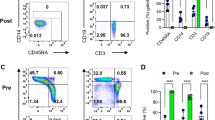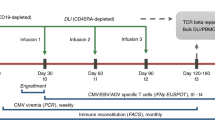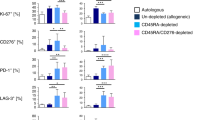Abstract
Pre-clinical studies of allogeneic stem cell transplantation suggest that depletion of naive T cells from donor lymphocytes will reduce the risk of GvHD but preserve immunity to infectious pathogens. In this study, we have established a clinical-grade protocol under good manufacturing practice conditions for purging CD62L+ naive T cells from steady-state leukapheresis products using the CliniMACS system. The efficacy of immunomagnetic CD62L depletion was assessed by analysis of cell composition and functional immune responses. A median 2.9 log CD62L depletion was achieved with no evidence of CD62L shedding during the procedure and a mean T-cell yield of 47%. CD62L− cells comprised an equal mix of CD4+ and CD8+ T cells, with elimination of B cells but maintenance of regulatory T cells and natural killer cell populations. CD62L-depleted T cells were predominantly CD45RA− and CD45RA+ effector memory (>90%) and contained the bulk of pentamer-staining antivirus-specific T cells. Functional assessment of CD62L− cells revealed the maintenance of antiviral T-cell reactivity and a reduction in the alloreactive immune response compared with unmanipulated cells. Clinical-grade depletion of naive T cells using immunomagnetic CD62L beads from steady-state leukapheresis products is highly efficient and generates cells suitable for adoptive transfer in the context of clinical trials.
This is a preview of subscription content, access via your institution
Access options
Subscribe to this journal
Receive 12 print issues and online access
$259.00 per year
only $21.58 per issue
Buy this article
- Purchase on Springer Link
- Instant access to full article PDF
Prices may be subject to local taxes which are calculated during checkout



Similar content being viewed by others
References
Montagna D, Yvon E, Calcaterra V, Comoli P, Locatelli F, Maccario R et al. Depletion of alloreactive T cells by a specific anti-interleukin-2 receptor p55 chain immunotoxin does not impair in vitro antileukemia and antiviral activity. Blood 1999; 93: 3550–3557.
Samarasinghe S, Mancao C, Pule M, Nawroly N, Karlsson H, Brewin J et al. Functional characterization of alloreactive T cells identifies CD25 and CD71 as optimal targets for a clinically applicable allodepletion strategy. Blood 2010; 115: 396–407.
Anderson BE, McNiff J, Yan J, Doyle H, Mamula M, Shlomchik MJ et al. Memory CD4+ T cells do not induce graft-versus-host disease. J Clin Invest 2003; 112: 101–108.
Chen BJ, Cui X, Sempowski GD, Liu C, Chao NJ . Transfer of allogeneic CD62L- memory T cells without graft-versus-host disease. Blood 2004; 103: 1534–1541.
Juchem KW, Anderson BE, Zhang C, McNiff JM, Demetris AJ, Farber DL et al. A repertoire-independent and cell-intrinsic defect in murine GVHD induction by effector memory T cells. Blood 2011; 118: 6209–6219.
Foster AE, Marangolo M, Sartor MM, Alexander SI, Hu M, Bradstock KF et al. Human CD62L- memory T cells are less responsive to alloantigen stimulation than CD62L+ naïve T cells: potential for adoptive immunotherapy and allodepletion. Blood 2004; 104: 2403–2409.
Teschner D, Distler E, Wehler D, Frey M, Marandiuc D, Langeveld K et al. Depletion of naive T cells using clinical grade magnetic CD45RA beads: a new approach for GVHD prophylaxis. Bone Marrow Transplant 2014; 49: 138–144.
Bleakley M, Heimfeld S, Jones LA, Turtle C, Krause D, Riddell SR et al. Engineering human peripheral blood stem cell grafts that are depleted of naive T cells and retain functional pathogen-specific memory T cells. Biol Blood Marrow Transplant 2014; 20: 705–716.
Davies JK, Koh MB, Lowdell MW . Antiviral immunity and T-regulatory cell function are retained after selective alloreactive T-cell depletion in both the HLA-identical and HLA-mismatched settings. Biol Blood Marrow Transplant 2004; 10: 259–268.
Peggs KS, Verfuerth S, Pizzey A, Khan N, Guiver M, Moss PA et al. Adoptive cellular therapy for early cytomegalovirus infection after allogeneic stem-cell transplantation with virus-specific T-cell lines. Lancet 2003; 362: 1375–1377.
Distler E, Bloetz A, Albrecht J, Asdufan S, Hohberger A, Frey M et al. Alloreactive and leukemia-reactive T cells are preferentially derived from naive precursors in healthy donors: implications for immunotherapy with memory T cells. Haematologica 2011; 96: 1024–1032.
Peggs KS, Thomson K, Hart DP, Geary J, Morris EC, Yong K et al. Dose-escalated donor lymphocyte infusions following reduced intensity transplantation: toxicity, chimerism, and disease responses. Blood 2004; 103: 1548–1556.
Hamann D, Baars PA, Rep MH, Hooibrink B, Kerkhof-Garde SR, Klein MR et al. Phenotypic and functional separation of memory and effector human CD8+ T cells. J Exp Med 1997; 186: 1407–1418.
Appay V, van Lier RA, Sallusto F, Roederer M . Phenotype and function of human T lymphocyte subsets: consensus and issues. Cytometry A 2008; 73: 975–983.
Berger C, Jensen MC, Lansdorp PM, Gough M, Elliott C, Riddell SR . Adoptive transfer of effector CD8+ T cells derived from central memory cells establishes persistent T cell memory in primates. J Clin Invest 2008; 118: 294–305.
Gattinoni L, Lugli E, Ji Y, Pos Z, Paulos CM, Quigley MF et al. A human memory T cell subset with stem cell-like properties. Nat Med 2011; 17: 1290–1297.
Kaneko S, Mastaglio S, Bondanza A, Ponzoni M, Sanvito F, Aldrighetti L et al. IL-7 and IL-15 allow the generation of suicide gene-modified alloreactive self-renewing central memory human T lymphocytes. Blood 2009; 113: 1006–1015.
Verdijk RM, Kloosterman A, Pool J, van de Keur M, Naipal AM, van Halteren AG et al. Pregnancy induces minor histocompatibility antigen-specific cytotoxic T cells: implications for stem cell transplantation and immunotherapy. Blood 2004; 103: 1961–1964.
Amir AL, D'Orsogna LJ, Roelen DL, van Loenen MM, Hagedoorn RS, de Boer R et al. Allo-HLA reactivity of virus-specific memory T cells is common. Blood 2010; 115: 3146–3157.
Lundqvist A, Smith AL, Takahashi Y, Wong S, Bahceci E, Cook L et al. Differences in the phenotype, cytokine gene expression profiles, and in vivo alloreactivity of T cells mobilized with plerixafor compared with G-CSF. J Immunol 2013; 191: 6241–6249.
De Boer F, Dräger AM, Van der Wall E, Pinedo HM, Schuurhuis GJ . Changes in L-selectin expression on CD34-positive cells upon cryopreservation of peripheral blood stem cell transplants. Bone Marrow Transplant 1998; 22: 1103–1110.
Distler E, Wolfel C, Kohler S, Nonn M, Kaus N, Schnurer E et al. Acute myeloid leukemia (AML)-reactive cytotoxic T lymphocyte clones rapidly expanded from CD8(+) CD62L((high)+) T cells of healthy donors prevent AML engraftment in NOD/SCID IL2Rgamma(null) mice. Exp Hematol 2008; 36: 451–463.
Albrecht J, Frey M, Teschner D, Carbol A, Theobald M, Herr W et al. IL-21-treated naive CD45RA+ CD8+ T cells represent a reliable source for producing leukemia-reactive cytotoxic T lymphocytes with high proliferative potential and early differentiation phenotype. Cancer Immunol Immunother 2011; 60: 235–248.
Bleakley M, Otterud BE, Richardt JL, Mollerup AD, Hudecek M, Nishida T et al. Leukemia-associated minor histocompatibility antigen discovery using T-cell clones isolated by in vitro stimulation of naive CD8+ T cells. Blood 2010; 115: 4923–4933.
Jedema I, van de Meent M, Pots J, Kester MG, van der Beek MT, Falkenburg JH . Successful generation of primary virus-specific and anti-tumor T-cell responses from the naive donor T-cell repertoire is determined by the balance between antigen-specific precursor T cells and regulatory T cells. Haematologica 2011; 96: 1204–1212.
Acknowledgements
This study was supported by Leukaemia Lymphoma Research, UK (RC), and by Fundação para a Ciência e a Tecnologia, Portugal (PSES). We thank Miltenyi Biotec for providing the CD62L clinical reagents and depletion kits for this study, and Svenja Siemer for her assistance with performing immune assays.
Author information
Authors and Affiliations
Corresponding author
Ethics declarations
Competing interests
The authors declare no conflict of interest.
Additional information
Supplementary Information accompanies this paper on Bone Marrow Transplantation website
Rights and permissions
About this article
Cite this article
Verfuerth, S., Sousa, P., Beloki, L. et al. Generation of memory T cells for adoptive transfer using clinical-grade anti-CD62L magnetic beads. Bone Marrow Transplant 50, 1358–1364 (2015). https://doi.org/10.1038/bmt.2015.135
Received:
Revised:
Accepted:
Published:
Issue Date:
DOI: https://doi.org/10.1038/bmt.2015.135
This article is cited by
-
CCR7+ selected gene-modified T cells maintain a central memory phenotype and display enhanced persistence in peripheral blood in vivo
Journal for ImmunoTherapy of Cancer (2017)



